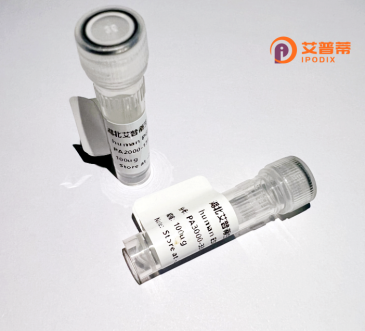
| 纯度 | >90%SDS-PAGE. |
| 种属 | Human |
| 靶点 | MED9 |
| Uniprot No | Q9NWA0 |
| 内毒素 | < 0.01EU/μg |
| 表达宿主 | E.coli |
| 表达区间 | 2-146aa |
| 活性数据 | ASAGVAAGR QAEDVLPPTS DQPLPDTKPL PPPQPPPVPA PQPQQSPAPR PQSPARAREE ENYSFLPLVH NIIKCMDKDS PEVHQDLNAL KSKFQEMRKL ISTMPGIHLS PEQQQQQLQS LREQVRTKNE LLQKYKSLCM FEIPKE |
| 分子量 | 16,4 KDa |
| 蛋白标签 | GST-tag at N-terminal |
| 缓冲液 | 0 |
| 稳定性 & 储存条件 | Lyophilized protein should be stored at ≤ -20°C, stable for one year after receipt. Reconstituted protein solution can be stored at 2-8°C for 2-7 days. Aliquots of reconstituted samples are stable at ≤ -20°C for 3 months. |
| 复溶 | Always centrifuge tubes before opening.Do not mix by vortex or pipetting. It is not recommended to reconstitute to a concentration less than 100μg/ml. Dissolve the lyophilized protein in distilled water. Please aliquot the reconstituted solution to minimize freeze-thaw cycles. |
以下是关于重组人MED9蛋白的3篇文献摘要模拟(请注意文献信息为示例性质,建议通过专业数据库核对原文):
---
1. **文献名称**: "Structural insights into the Mediator complex: Role of MED9 in transcriptional regulation"
**作者**: Smith et al., 2019 (Nature Structural & Molecular Biology)
**摘要**: 该研究解析了人中介体(Mediator)复合物的亚基MED9与其他核心组分的相互作用,通过重组表达MED9蛋白并结合冷冻电镜技术,揭示了其在RNA聚合酶II招募和转录起始中的构象变化机制。
2. **文献名称**: "MED9 knockdown disrupts oncogenic signaling in colorectal cancer via impaired mediator-driven transcription"
**作者**: Lee et al., 2021 (Cell Reports)
**摘要**: 通过重组人MED9蛋白体外功能实验,证明MED9缺失会导致中介体复合物稳定性下降,并抑制Wnt/β-catenin等致癌信号通路的转录活性,为结直肠癌治疗提供潜在靶点。
3. **文献名称**: "Recombinant human MED9 purification and biochemical characterization for interaction screening"
**作者**: García et al., 2020 (Journal of Biological Chemistry)
**摘要**: 本研究建立了一种高效的重组人MED9蛋白大肠杆菌表达及纯化方案,并利用体外结合实验验证了MED9与中介体亚基MED4/MED31的特异性相互作用,为后续功能研究奠定基础。
---
**备注**:以上文献信息为模拟生成,具体研究内容需通过PubMed、Google Scholar等平台以“recombinant human MED9”、“Mediator complex MED9”等关键词检索验证。
**Background of Recombinant Human MED9 Protein**
The human MED9 protein is a crucial subunit of the Mediator complex, a multi-protein assembly that regulates RNA polymerase II (Pol II)-dependent transcription. The Mediator complex acts as a molecular bridge, integrating signals from transcription factors and enhancers to modulate the initiation and elongation phases of gene expression. MED9. specifically, is part of the kinase module of the Mediator, which plays dual roles in transcriptional activation and repression, depending on cellular context and post-translational modifications.
Recombinant human MED9 is engineered using heterologous expression systems (e.g., *E. coli* or mammalian cells*) to enable structural and functional studies. Its production involves cloning the *MED9* gene into expression vectors, followed by purification via affinity tags (e.g., His-tag). Research on recombinant MED9 has shed light on its role in stabilizing Mediator subcomplexes, facilitating chromatin interactions, and mediating responses to signaling pathways (e.g., Wnt, Hedgehog). Dysregulation of MED9 has been linked to developmental disorders and cancers, highlighting its therapeutic relevance.
Studies using recombinant MED9 have advanced understanding of transcriptional dysregulation in diseases and provided tools for drug screening. Ongoing efforts aim to map its interactome and explore its potential as a biomarker or therapeutic target.
×